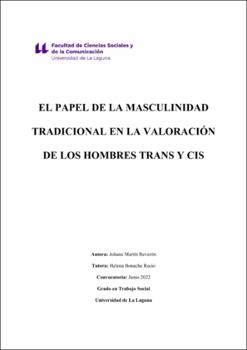El papel de la masculinidad tradicional en la valoración de los hombres trans y cis.
Author
Martín Reverón, JohanaDate
2022Abstract
El objetivo principal de este trabajo de investigación es examinar el papel de la
masculinidad en la percepción social hacia las personas trans, concretamente, hombres trans.
Para ello, es necesario realizar un breve recorrido sobre la cultura patriarcal infundada en
nuestra sociedad, así como indagar en las creencias esencialistas de género y cómo esto
afectaría en menor o mayor medida dependiendo de si son hombres trans o cis. Por último, se
tratará la deshumanización en las personas trans.
Para alcanzar dicho objetivo se realizó un diseño experimental intersujeto. A través de
un cuestionario, los y las participantes visualizaron uno de los escenarios propuestos (hombre
trans vs. hombre cis), de manera totalmente aleatoria a través del programa Qualtrics. La mitad
de los participantes visualizó un escenario sobre un chico trans, y la otra mitad, el mismo
escenario, pero cambiando únicamente la presentación del target como chico cis. En total
participaron 133 sujetos. Con ello se pretendía analizar si existen diferencias actitudinales hacia
los hombres en función de su identidad de género. En concreto, se examinó 1) las actitudes de
las personas sobre la masculinidad; 2) la deshumanización y cosificación de los hombres trans,
a través de la variable agencia; y, por último, 3) la relación entre las actitudes de masculinidad,
agencia y las creencias esencialistas de género. Los análisis de datos de las respuestas recogidas
se realizaron con el programa estadístico SPSS.
A través de esta investigación se concluyó que la masculinidad hegemónica influye en
las creencias esencialistas de género y, por consiguiente, en mayores prejuicios hacia el
colectivo trans. Asimismo, se han encontrado diferencias en la percepción de los hombres cis
y trans en las variables analizadas en este estudio. Los resultados permiten ampliar el
conocimiento sobre los prejuicios hacia el colectivo, lo que permitiría diseñar intervenciones
eficaces para la reducción de la transfobia. The main objective of this research work is to examine the role of masculinity in the
social perception towards trans people, specifically, trans men. For this, it is necessary to make
a brief review of the unfounded patriarchal culture in our society, as well as to investigate
essentialist gender beliefs and how this would affect it to a lesser or greater extent depending
on whether they are trans or cis men. Finally, the dehumanization of trans people will be
discussed.
To achieve this objective, an intersubject experimental design was carried out. Through
a questionnaire, the participants visualized one of the proposed scenarios (trans man vs. cis
man), completely randomly through the Qualtrics program. Half of the participants visualized
a scenario about a trans boy, and the other half, the same scenario, but only changing the
presentation of the target as a cis boy. In total, 133 subjects participated. This was intended to
analyze whether there are differences in attitudes towards men based on their gender identity.
Specifically, 1) people's attitudes about masculinity are presented; 2) the dehumanization and
objectification of trans men, through the agency variable; and, finally, 3) the relationship
between attitudes of masculinity, agency and gender essentialist beliefs. The data analyzes of
the responses collected were performed with the statistical program SPSS.
Through this research, it was concluded that hegem masculinity influences essentialist
gender beliefs and, consequently, greater prejudice towards the trans collective. Likewise,
differences have been found in the perception of cis and trans men in the variables analyzed in
this study. The results allow expanding knowledge about prejudices towards the group, which
would allow the design of effective interventions to reduce transphobia.





